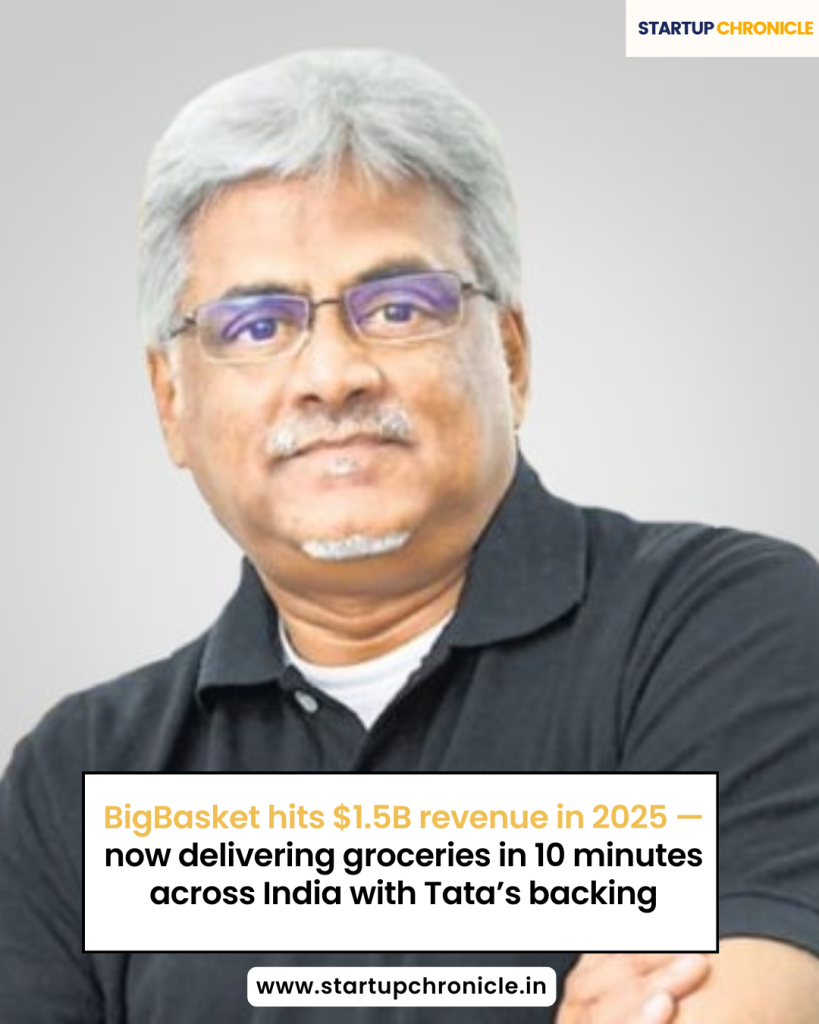India’s pioneering online grocery platform BigBasket has completed a remarkable transformation in its 14-year journey — evolving from an e-grocery startup into a quick commerce and supply chain powerhouse. Founded in 2011 by Hari Menon and his team, BigBasket today caters to over 40 million active customers across 400 cities, with an annual revenue surpassing $1.5 billion in FY2025.
Backed by the Tata Group, which acquired a majority stake in 2021 for $1.8 billion, BigBasket has become the backbone of Tata Digital’s consumer ecosystem — integrating seamlessly with platforms like Tata Neu to offer groceries, personal care, and household essentials through both scheduled and instant deliveries.
The Rise of Quick Commerce
In 2025, BigBasket’s fastest-growing segment is BB Now, its quick-commerce arm promising 10-minute delivery across urban India. With over 350 micro-fulfillment centers and real-time inventory technology, the company delivers essentials such as fruits, vegetables, dairy, and FMCG products to millions of customers daily.
“Our goal isn’t just speed — it’s reliability at scale,” said Hari Menon, Co-founder and CEO. “We’ve built India’s most efficient urban supply chain by blending technology, local sourcing, and sustainable logistics.”
Quick commerce now contributes nearly 30% of BigBasket’s overall revenue, up from just 10% two years ago, positioning the company as a direct rival to Zepto, Blinkit, and Swiggy Instamart.
Technology and Supply Chain Strength
Behind BigBasket’s success lies a data-driven operations model. The company uses AI-powered demand forecasting and automated dark store management to predict consumer needs and minimize wastage — a long-standing challenge in India’s grocery market.
It sources products directly from 15,000+ farmers and 2,000+ FMCG partners, ensuring competitive pricing while maintaining strict quality standards.
BigBasket has also made significant strides in green logistics, deploying 1,000+ electric vehicles across major cities and introducing eco-packaging for fresh produce.
“We’re building for efficiency and sustainability,” said Ramesh Chandra, Chief Supply Officer. “Every delivery we make is backed by years of investment in AI, logistics, and partner networks.”
Integration with Tata Neu
The acquisition by Tata Group in 2021 was a turning point. BigBasket’s integration into Tata Neu, the conglomerate’s super app, has helped it tap into a wider consumer base while leveraging Tata’s ecosystem of brands, from Tata Consumer Products to Croma and Tanishq.
This synergy enables cross-platform loyalty programs and combined offers, driving higher user retention and engagement. Tata Digital’s support also accelerated BigBasket’s expansion into tier-2 and tier-3 cities, where grocery delivery adoption is now growing at 40% year-on-year.
Competitive Edge and Future Growth
As India’s online grocery market is projected to exceed $40 billion by 2030, BigBasket’s hybrid model — combining scheduled, subscription, and instant delivery — provides it a competitive edge.
The company recently launched BB Marketplace, allowing regional sellers to list products and reach customers directly, expanding beyond groceries into home and lifestyle categories.
Analysts say BigBasket’s evolution mirrors India’s digital consumption wave. “BigBasket’s strength lies in its adaptability,” noted Anita Verma, retail analyst at RedSeer. “It’s managed to balance profitability, speed, and service — a rare combination in quick commerce.”
Looking Ahead
For FY2026, BigBasket plans to expand its BB Now network to 500 cities, introduce AI-powered personalized shopping, and invest in supply chain automation to reduce costs.
With Tata’s long-term backing and a loyal customer base, BigBasket is not just competing in the grocery market — it’s defining it.
Last Updated on Wednesday, October 29, 2025 2:02 pm by Startup Chronicle Team
